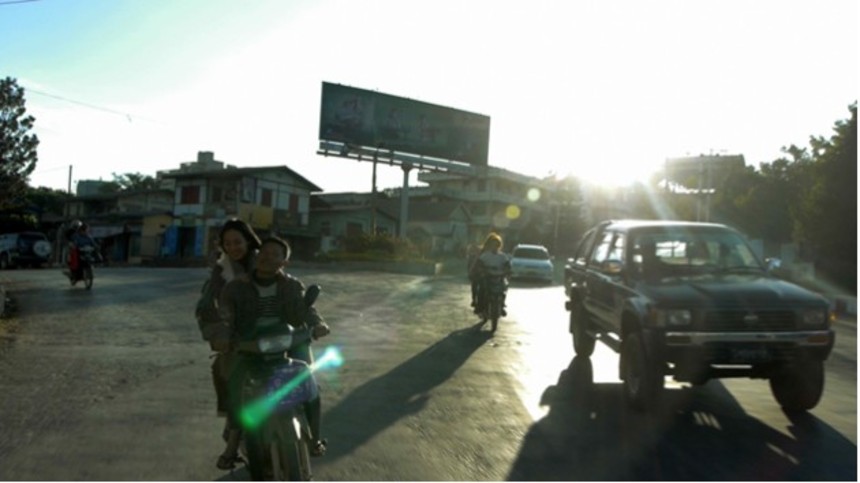Tribeca 2014 Review: ICE POISON, A Mesmerizing, Stark Depiction of Drugs and Poverty in Burma

Grinding poverty and severely restricted life and economic choices push two impoverished denizens of Myanmar into drug dealing, and using, with predictably dire consequences in Midi Z's strong, stylistically assured third feature Ice Poison.
As in his previous features Return to Burma (2011) and Poor Folk (2012), Midi Z sets Ice Poison in Lashio, the place of his birth, in the northern part of Burma, near the border with China, and home to large ethnic Chinese population. Midi Z shows us the side of the country that tourists are shielded from, with the lives of ordinary citizens struggling to survive. He does this with a deliberately paced, minimalist documentary-like aesthetic, with copious long takes building to mesmerizing effect, mirroring the way Midi Z's two central characters succumb to their addiction, sealing the hopeless fates they have set out to escape.
As in his previous features Return to Burma (2011) and Poor Folk (2012), Midi Z sets Ice Poison in Lashio, the place of his birth, in the northern part of Burma, near the border with China, and home to large ethnic Chinese population. Midi Z shows us the side of the country that tourists are shielded from, with the lives of ordinary citizens struggling to survive. He does this with a deliberately paced, minimalist documentary-like aesthetic, with copious long takes building to mesmerizing effect, mirroring the way Midi Z's two central characters succumb to their addiction, sealing the hopeless fates they have set out to escape.
Ice Poison begins by focusing on two vegetable farmers, a young man (Wang Shin-Hong) and his father (Zhou Cai Chang), who are struggling mightily to earn money to survive, but bad harvests, low prices for their goods, and restrictive government policies have made this nearly impossible for them. The father tries to borrow money from friends and relatives, but none are in any position to help, all suffering from similarly dire economic circumstances. The son wants to try working as a jade miner, but the father is against that, fearing his son will become a drug addict like many other miners.
Eventually they come to Uncle Wang (Li Shang Da), who loans an old scooter to the father, so that his son can try to make money as a scooter taxi driver. The father puts up his prized cow as a down payment, with Uncle Wang's stipulation that if the father doesn't come up with the rest of the money to buy the bike, the cow will be sold to a slaughterhouse.
Thereafter, the father largely disappears from the rest of the story, as the son sets up shop at the local bus depot, soliciting taxi rides from the disembarking passengers. In a long scene shot from overhead, we see that he isn't very successful in getting business; competition from many other drivers also trying to grab passengers, some of them with actual proper taxis, make it very difficult for the young man to get customers.
The story then shifts to its other central character, Sanmei (Midi Z regular Wu Ke-Xi), a young Chinese-Burmese woman who has just returned from China to visit her dying grandfather, and eventually to bury him. Sanmei is introduced to the film as the first fare we see the young scooter driver successfully snag. After he drops her off, we stay to observe Sanmei and her mother, with the help of a priest, perform the final rituals to ease her grandfather's passage to death.
Back in China, Sanmei was tricked into marriage with a much older man; she's left behind a young son whom her husband wouldn't allow Sanmei to bring with her to Burma. Although she was coerced into the marriage and doesn't love her husband, Sanmei's mother advises remaining with him since she's at least well cared for, and her husband doesn't beat her. Sanmei has no intentions of returning, however; she plans to look for work in Burma and eventually earn enough money to bring her son back from China.
Sanmei has a few more encounters with the scooter driver, who by now has given up soliciting fares and currently hires himself out to make deliveries. Sanmei's cousin, a dealer in "ice" - the local euphemism for crystal meth - has offered her work delivering the drug to customers in the area. Sanmei persuades the scooter driver to be her hired transportation, promising that he won't have to be involved with any of the transactions. As they work together, a rapport between them emerges, as well as the barest hint of a romance, as they pass the time singing in karaoke bars and smoking copious amounts of the product they peddle. Predictably, this path doesn't end well for either of them.
Burmese-born, Taiwan-based director Midi Z employs his observational style to engrossing effect, his dispassionate gaze starkly depicting the constricted options of his characters, which lead them to desperate and self-destructive actions. And while the final scene, showing the fate of the cow put up as collateral for the scooter, will strike some as excessively graphic, it still serves as a potent metaphor for the economic and psychological devastation of many Burmese, which Midi Z so powerfully and vividly shows us.
Ice Poison will stream for free through the end of the festival as part of the Tribeca Online Festival. For more information, and to watch the film, visit the festival's website.
Ice Poison
Director(s)
- Midi Z
Writer(s)
- Midi Z
Cast
- Shin-Hong Wang
- Ke-Xi Wu

Do you feel this content is inappropriate or infringes upon your rights? Click here to report it, or see our DMCA policy.






